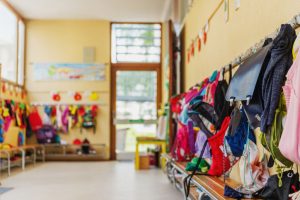By Scott Wilson
In many states, it was the schools that felt it first.
The explosion of COVID-19 cases across the country has thrown both higher and lower education into disarray – from preschool classrooms to the college lecture halls where tomorrow’s ECE teachers are earning their credentials.
Schools across the country have closed campuses entirely, and a lot more are sure to follow – maybe all of them before the end of spring semester. And it’s looking like those closures will last at least until summer, and possibly on a rolling basis even into the next school year.
Whether under state orders to close up shop, or in voluntary compliance with the urgent recommendations coming from the public health community, if you are a college student who started the school year on-campus, chances are your courses will be exclusively online by the time you’re back from spring break – if they aren’t already.
The situation has forced many schools to make the switch to online-only curriculum almost overnight, even for programs not previously offered remotely.
You might not have chosen an online degree when you first enrolled in your early childhood education program, but if you’re lucky enough to be at a school that hasn’t cancelled classes entirely, you’re probably in one now.
We feel your pain. And though you’re certainly not alone in this unexpected situation, the challenges you face as an ECE student in the midst of the pandemic are going to be harder and more complicated than they will be for many other college students.
- ECE Classrooms Won’t Be the Same in the Post-Pandemic World
- Can You Get the In-Class Student Teaching Hours You Need Remotely?
- The Biggest Challenges Will Come in the Days Immediately After the Pandemic
- The Nuts and Bolts Requirements to Become a Successful Online ECE Student Overnight
- Learning How to Do Things Remotely Will Give You Important Skills for Your Career
- With Preschools Serving as Vital Support For Healthcare Workers, We’re Being Forced to Rethink Childcare Contingency Planning
ECE Classrooms Won’t Be the Same in the Post-Pandemic World
It’s bad enough that you have to suddenly shift to online courses when what you signed up for was the camaraderie and support that come with meeting up on campus every day with a group of like-minded fellow students. But even worse, you’re doing it in the middle of a global pandemic.
There are already a well-worn set of challenges for remote students to overcome: maintaining self-discipline to get the work done… coping with loneliness and disconnection from classmates… developing time management skills… evolving computer literacy to get the most out of online learning systems.
On top of that, as you look ahead to that first year of your career, you’ll have the psychological well-being of your future students to think about. You’ll not only have all the normal anxieties that come with stepping into your own classroom for the first time, it will be compounded by the fact that it’s going to be a classroom full of kids dealing with both their own anxieties as well as the possibility of problems at home related to parents or grandparents who may have fallen sick, or worse, or who otherwise may have lost their job.
It’s a lot of responsibility for someone who hasn’t even earned their degree yet, and a lot to prepare for. But kids can be surprisingly resilient, and you might actually find yourself learning something from them about the best way to get through that first year.
In the end, there’s likely to be a major push to restructure and improve funding for early childhood education after COVID-19 has been conquered. Educators in the field might find more stability, higher pay, and more opportunities. These are big changes that could fundamentally reshape the landscape of early childhood education in the early years of your career, so it’s a good idea to think about all the positive things that could come out of the tragedy we’re currently living through…
More Flexible Childcare Options
With gaps in the childcare system becoming clear during the current round of school closures, expect states and districts to develop more flexible childcare and education options ahead of the potential resurgence of COVID-19 expected in the fall. Whether it’s in the form of emergency childcare centers that are put in place temporarily in times of crisis, or better staffing and preparation for existing programs, you can count on the system being more flexible in dealing with crisis situations in the near future.
Better Classroom Infection Control Processes
Of course, no one knows better than preschool teachers how hard it is to get kids to reliably wash their hands. And that probably goes double for more advanced infection control procedures, like covering mouths when coughing, not sharing juice boxes, and not chewing on toys.
Teaching and enforcing those behaviors will be your job, and at the same time all the new classroom sanitizing protocols are going to fall to you too. All that emphasis could have some wonderful secondary effects, as well… you have the opportunity to help teach and raise what might end up being the healthiest generation on record.
Better Job Protections For Early Childhood Educators
Seeing tens of thousands of preschools close almost overnight as a necessary step to slowing the spread of the virus, and as healthcare workers scramble to find a backup plan for childcare so they can tend to the waves of people flooding ERs around the country, there is renewed attention to just how critical quality childcare is to a functioning workforce.
With more waves of COVID-19 likely until a vaccine is developed, there could be some fast-track protections put in place to ensure childcare is available to healthcare workers in any situation, and that pre-K teachers are properly compensated for keeping the system running.
The long-term effects of the pandemic are hard to predict. All we know for sure right now is that new hygiene and behavioral protocols are sure to be in place in pre-K classrooms for many years to come, and that’s going to have an effect on how you do things every day.
But for now, you have some immediate challenges you need to attend to. You’ve got courses to complete, and that means getting into a new routine to adapt to online-only coursework as quickly as possible.
Can You Get the In-Class Student Teaching Hours You Need Remotely?
Fortunately for you, the tools for earning an ECE degree online are a well-trodden path for educators across the country. There were plenty of online programs long before now; people know how to teach them and the curriculum is just as effective as your on-campus classes have been.
But there is a hitch: early childhood educators are trained from the outset through experiential learning placements in real classrooms.
In a typical online degree program, that’s no problem. Your college would just line you up with a local partner school to complete the required in-class student teaching experiences exactly the same as a regular campus-based program would.
Now, however, those schools may be closed, just like yours is.
Solutions that different states are coming up with run the gamut. Some states have suspended all student teaching placements, even when classrooms are still open… some have left the decision up to individual districts where the placements were made… in some places, schools are even arranging for student teaching placements to be done online using videoconferencing services.
Some states have offered guidance about the situation and how it will affect licensing requirements; the New Jersey Department of Education has assured some schools that it will be flexible with requirements during the current situation while Kentucky has stated explicitly that non-traditional instruction days will meet the requirements. But many states have yet to carve out exceptions for student teachers who can’t, well, student teach during the crisis.
Even if you are lucky enough to have clear guidance on how your program will handle student teaching hours and gives you the option of doing it remotely, there may be technological limitations to work through. Even if your college has a conventional and well-supported Learning Management System (LMS) with the videoconferencing capabilities to support a remote student teaching experience, your host school could be scrambling to piece together an ad hoc remote teaching system using off-the-shelf software like Zoom.
It’s going to be a confusing ride with its share of challenges, but that’s teaching in a nutshell, isn’t it? Think of it as an early master-class in how to be adaptable in the ever-changing field of early childhood education.
The Biggest Challenges Will Come in the Days Immediately After the Pandemic Draws to a Close
In the months ahead as the outbreak is brought under control, you will go on to start your career working with pre-K students in a world where social behaviors and hygiene protocols are very different from what they were when you first decided to become a preschool teacher – and they likely will remain that way for the rest of your career.
As anyone who has ever worked around pre-K kids knows, they can spread common colds and flus like no other age group. In normal times, that can be slightly annoying. With a chronic respiratory disease like COVID-19, it’s potentially deadly.
Even with the possibility of something like this rearing its head again being pretty remote, there will certainly be a new way of doing things after the dust settles. Eventually these new practices will become the new normal, engrained in habit and as natural as anything we do a hundred times a day without a second thought. But there will be a learning curve to get there, for both you and your students. What you need to be thinking about now is how to prepare for that first school year back in the classroom, during those months before new behavior patterns are etched into our daily lives and the memory of the pandemic is still fresh on your mind, and in the memories of your students.
You already have a sense of what those new protocols and behaviors are going to be, and you’re going to have plenty of time to start practicing them and making them habitual by the time you start your job in a local preschool or Head Start program.
Even if you get everything right with the hand-washing, disinfecting surfaces, and taking pains to precautionarily avoid cross-contaminating anything with invisible viruses that aren’t even there anymore, you still might have some anxiety over your own health. The biggest challenge may actually be figuring out how to avoid passing any of that anxiety on to the kids. What’s likely to weigh even heavier on your mind is the fact that many of your students are going to have some of those same anxieties already, as well as some others based on how the pandemic may have affected their lives at home.
Of course, you’ll be the one that needs to be there to reassure them that everything will be fine, while at the same time reinforcing the importance of following new hygiene practices to the letter. The challenge is clear at first glance, and it’s nothing new to early childhood educators: how do you teach kids about consequences without creating anxiety about the possibility that those potential consequences become real?
There are classic behavioral reinforcement tools you can use to encourage positive behaviors, some of which you will learn about in your ECE program. But in the months immediately after this humanitarian crisis finally comes to an end, finding the balance between conveying the importance of following these behaviors without creating anxiety will largely fall to your innate ability to be compassionate and gentle while explaining something with very serious implications. It’s likely this innate ability that brought you to this profession in the first place, so it’s going to be important to believe in yourself.
Of course, you have no control over economic hardships or anything else that takes place outside of the classroom, but it’s those very things that often affect pre-K students the most, influencing not only their nutrition and their health, but also their psychological well-being. Statistically, you’re likely to have kids in class whose parents are suddenly out of jobs; maybe a parent or grandparent wound-up in the hospital, or worse.
And beyond all of it, the dark, swirling uncertainty that is gripping much of the world right now is all the more bewildering and intense for kids sensing anxiety in the adults around them and experiencing instability in the home.
You may very well be the most normal part of those kids’ lives.
Viewed in that light, continuing your education might be the most important thing you can be doing right now.
The Nuts and Bolts Requirements to Become a Successful Online ECE Student Overnight
Although an online program isn’t what you initially signed up for, the good news is that most colleges are already set up to deliver curriculum online. And if they have an online version of the same program, they’re already offering the exact same ECE curriculum you’re taking. If that’s the case, you’ll be able to make the transition with less stress and heartache than you might think.
And even if your school isn’t equipped for that, you’re not going to let some technological challenges stand in the way of you and your degree. You’re an aspiring preschool teacher after all, so you already know that the ability to think on the fly, to be highly flexible, adaptable, and creative in coming up with solutions is all part of the job.
The technology is there to make it easy for you to put together the set of tools you’re going to need to make it happen. If you’re serious about finding a work-around, and you put your mind to it, you will have no problem making the transition.
- Learning Management Systems Take the Classroom Experience Online
- How Online Classes Operate
- Coping with Technical Issues in a Sudden Move to Online Schooling
- What Kind of Hardware Do Online Early Childhood Education Classes Require?
- What Kind of Software Do You Need For Online Early Childhood Education Courses?
- Availing Yourself of Other Services Your School Offers
Learning Management Systems Take the Classroom Experience Online
If your school already offers online courses in early childhood education or any other program, then it already has a learning management system (LMS) in place, and an IT department that’s really familiar with how it works and how to troubleshoot common issues.
The most popular learning management systems colleges use include:
The LMS is software designed by third-party companies for the education industry, but are highly customizable for individual schools and the specific programs they offer. These systems anticipate every need and provide one-stop-shopping for just about everything that both students and instructors could possibly use for online teaching and learning. This means web- or app-based services for things like:
- Assignment tracking and a secure portal for submitting completed work
- Video and audio-conferencing
- Streaming services for recorded classes and lectures
- Quizzing and testing
These learning management systems are so secure and capable that many schools are now using them to deliver other services that have been closed because of the pandemic, including tutoring and counseling.
These learning management systems are typically used by colleges so you’re not likely to find sophisticated systems like this in place at the preschools and Head Start programs that host your student teaching experiences. When it comes to working with students remotely from home during the COVID-19 outbreak, you’re more likely to find systems cobbled together with common videoconferencing software you may already be familiar with:
And in a pinch, even basic e-mail can work to get you and your instructor together; nothing fancy is required… just a little patience as the details get worked out.
How Online Classes Operate
There are two formats through which online courses are presented:
- Synchronous – This is the format you are probably most familiar with. The instructor teaches in real-time, usually through a video or audio stream, while students watch and have the opportunity to participate or ask questions via chat or videoconference. Most LMS platforms have virtual whiteboards and other ways for the instructor to present additional material during class. The session may be recorded so you can review it later.
- Asynchronous – No, this isn’t like when you have to speak at a level well above “inside voices” and it takes ten minutes to get your class to pay attention to you. Asynchronous courses are delivered on-demand. The audio, visual, or textual presentation of the class is recorded by the instructor, and then made available to students at any time of day or night. Feedback is available through chatrooms, forums, or e-mail for questions. You complete assignments on your own time and upload them by a deadline in the LMS.
Many LMS support both, so how your classes are run may depend on your instructor’s preferences.
Coping with Technical Issues in a Sudden Move to Online Schooling
Since you didn’t sign up for an online program in the first place, you may have been operating under the rosy assumption that you weren’t going to need high-speed home internet access and a top of the line laptop when you started the school year.
But your college recognizes that you may have been caught by surprise here, and many schools are stepping up to help out students who don’t have systems that meet the minimum requirements. Check with your college IT department about computer loaner programs or temporary Wi-Fi cellular hotspots for internet access. Be patient and be realistic! There are many others in the same boat.
The truth is, though, that many modern LMS platforms are pretty easy when it comes to meeting hardware and internet speed requirements. You might find you can even use your phone or an inexpensive tablet… even during the pandemic, Amazon still delivers.
What Kind of Hardware Do Online Early Childhood Education Classes Require?
Hardware requirements are typically pretty minimal for online classes. Pretty much any Mac or PC made within the last five years or so is going to be just fine; frequently, even older hardware will be adequate.
There are some other pieces of equipment that are nice to have, though. If you have a couple extra bucks and think it makes sense, consider ordering the following:
- Quality Microphone and Webcam – If you’ve found your laptop or desktop camera and mic to be buggy during Skype calls with your parents, then now is the time to upgrade. The good news is that an accessory like that is really inexpensive and very available these days, and that one small upgrade could be all your computer needs to get you through the next few school years without a lot of annoying audio issues. More than most degrees, ECE programs involve presentations and mock teaching practice… not to mention actual classroom management if you are in the middle of your student teaching rotation. So it’s important not only that you be able to see your instructor or students through videoconferencing, but that they be able to see and hear you!
- Widescreen or multiple monitors – Screen real-estate is at a premium in online video conferencing and live classes—you want to be able to see the virtual blackboard, the instructor, and possibly other references all at the same time without destroying your eyes. And when doing a student teaching assignment remotely, the difference between a 15 inch laptop monitor and even a relatively small standard external monitor can make all the difference in bringing that experience to life – on both ends of the camera. Get a widescreen monitor, or more than one… you’ll never go back!
- Tablet – Another useful tool is a tablet or mobile device that you can use as a handy reference while your main rig is tied up with streaming video or other coursework. This is useful for notes, reference materials, or even multitasking. It’s definitely an extra, but it’s one you won’t regret having if you can fit it into the budget.
What Kind of Software Do You Need For Online Early Childhood Education Courses?
While your school’s LMS will generally take care of all the basics you need for viewing and participating in class, you’re likely to need other software on your home computer to complete assignments and take part in other activities and presentations. A copy of Microsoft Office is almost mandatory; the company has an academic package called Office 365 Education that allows you to download most of the programs included in the suite dirt cheap. Check with your school’s IT department about getting signed up for it.
There are a number of other software tools that you might benefit from, for note-taking and document processing… as well as for managing your time – and the many online distractions that might be competing for it:
Many colleges are setting up resource pages on their websites to deal with the common demands of panicked students in your exact same situation. Check there first; they’re going to know exactly what will work best with their own systems.
Since preparing to be an educator means taking on the role of both a student and a teacher at the same time, you are likely to experience the challenges on both sides – adapting to online courses, while working with students and parents who are trying to make the same types of adaptations. That means you will benefit doubly from COVID-19-specific resources that your department of education might be making available, which could be similar to those listed on the California Department of Education website.
Avail Yourself of Other Services Your School Offers – It Will Make the Transition Easier
Of course, you didn’t just lose access to classrooms and lecture halls when you college closes down; any other on-campus services that you might have relied on as a traditional student are suddenly out the window as well. Everything from on-campus career services to medical clinics to libraries are being shut down, if they aren’t already.
But, once again, colleges are working hard to fill in the gaps left by these sudden closures. Yours may offer:
- Digital library services and online journal access
- Remote career counseling and mentorship
- Online writing and tutoring services
And remember, you’re on your way to becoming an educator yourself; if you see a gap where there should be a scholarly service, think about how you might fill it, and make a proposal! It’s the right time to step up and volunteer your time or any good ideas you might otherwise be keeping to yourself.
Learning How to Do Things Remotely Will Give You Important Skills for Your Career as a Pre-K Teacher in the Post-Pandemic World
As long as you are adjusting to the technical aspects of online learning, you should probably think about some of the long-term implications of the virus. What you’re picking up now for remote study skills might have a much more general application than just the next semester or two.
The way this ends isn’t clear to anyone right now. But the one thing that seems certain is that things won’t just snap back to normal. You’re probably going to enter a profession that is quite a bit different in some ways than it was when you started your ECE degree program.
Online learning trends were already increasing, but the ways that school districts and childcare centers are being forced to adapt to the current situation will only accelerate that. And as one or more waves of COVID are likely to come before a vaccine is developed, next year is pretty likely to require some additional social distancing efforts, with more and more reliance on online teaching. It will probably become engrained in the practices of early childhood education as the advantages are discovered and techniques perfected.
So the things you are learning just by adjusting to online coursework might actually turn out to be some of the most important skills you pick up for the rest of your career.
With Preschools Serving as Vital Support For Healthcare Workers, We’re Being Forced to Rethink Childcare Contingency Planning… and the Entire ECE System
Although school closures are the order of the day, some preschools and childcare centers have remained open under various versions of lockdown orders – but it’s not in defiance of these orders, it’s out of necessity. After all, even people working in critical industries have childcare needs.
But the financial wheels have come off at many of those preschools and care centers, since parents who can stay home have generally kept their children home as well, money flowing into private preschools has dried up. The entire industry suffers from the dual fates of being too critical to close and yet not financially viable when attendance drops.
The hastily constructed CARES Act passed by Congress to deliver coronavirus relief to a range of industries. The Act is attempting to plug the gaps with a variety of provisions aimed squarely at early childhood education:
- $3.5 billion to support the Child Care Development Block Grants for early childhood education access for the children of essential workers
- $750 million for Head Start
- $8.8 billion for child nutrition programs (since many food programs were delivered through now-closed school programs)
- $16 billion delivered for discretionary spending to state school systems through a variety of channels and with ECE as one possible funding destination
Even as billions are being frantically poured into the system, anyone with a clear enough head to look at the entire picture will see that the current structure of child-care and early childhood education that’s been in place for decades isn’t adequate during major disruptions… and the situation is revealing something that many teachers have known all along: it’s not really adequate even when everything is functioning normally either.
But there is a renewed sense of hope, and it’s not just the kind of hope based on wishful thinking. In the wake of national emergencies, mountains get moved to make sure we’re prepared for the next big “what if”, no matter what that might be. This time around, everyone seems to be giving some real thought to how ECE programs and the teachers who lead them provide a vital support system for healthcare workers and first responders, who are also parents. The nation is coming to appreciate how much it relies on preschool teachers and ECE programs in difficult times like these, and that realization may very well be enough to result in adequate funding and contingency planning to keep these vital programs going strong in good times and bad.

Scott Wilson
Scott Wilson is an author and information technology consultant based in the Pacific Northwest. He has a bachelor’s degree in English from the University of Washington and has worked in the information technology industry for more than 20 years as a system administrator, IT manager, and consultant.












